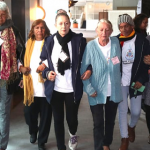Kids to Spend Christmas in Hotel Rooms with Strangers

At any time in NSW alone, there are around 150 children accommodated in hotels under the care of Family and Community Services (FACS). It’s no different at Christmas time.
While many kids will wake up wondering what surprises are wrapped under the tree, these kids will wake up with relative strangers – carers – some of whom they barely know, in impersonal hotel rooms, most of them desperately only wanting one thing: a place to call home.
Stories about the crisis being faced by Family and Community Services (Facs) are not new. In New South Wales, more than 3500 children enter out-of-home-care each year, and there has been an extraordinary 373 per cent increase in the number of kids in care over the past 20 years. The serious a shortfall of foster carers means that about 660 are needed in NSW to keep up with demand.
Currently there are almost 20,000 children and young people in Out of Home Care in this state alone. Children as young as three, are being housed in hotel rooms, the majority in Western Sydney, being looked after by support workers on rostered shifts. Aboriginal children, already over-represented in the system, are also the fastest-growing group of young people needing out-of-home care.
Some will be accommodated in this way for only a few nights, but others have to wait months until a placement with a foster carer can be arranged. And these are highly vulnerable children, many who have experienced neglect, physical and sexual abuse, and been witnesses to horrendous, repeated family violence.
A broken, ineffective system
A recent report into the child protection by former public servant David Tune, found that the system is “ineffective and unsustainable, “crisis-driven” and “failing to improve long-term outcomes.”
The scathing report was released earlier this year, after the State Government resisted several calls to make it public.
It found that only one in three reports of children at risk of significant harm are being investigated by a family and community services (FACS) worker.
Almost three in every four cases (72%) were closed without further investigation, even where the risk of serious harm was recorded as “high” or “very high”.
Wasted funds
Mr Tune’s investigations also discovered that at least $450m has been spent, and 61 different programs delivered, with “no overarching logic to guide investment and … little systemic impact”.
Its findings concluded that $302m of spending was on programs “where the effectiveness is unknown” because around 67% of Facs programs for vulnerable children and families have not been evaluated, making it difficult to assess effectiveness and focus investment to drive real change and impact positive outcomes for children and their families.
But significantly, the report found that the system failed to meet opportunities for early intervention, where most experts say the best outcomes can usually be achieved, with lower cost. By working with families in crisis at the earliest possible juncture, it is possible in some cases, that the children can stay with their parents, and the family can be monitored and supported.
Failing to protect children
Instead, with the risks of returning them to their biological parents too great, and adoption not always a suitable answer, children are being placed into a system which has significant and devastating failings. There have been many cases of abuse, drug use, and neglect by approved foster carers. There’s also the high-profile case of William Tyrell, who disappeared while in foster care, a detail which Facs sought extremely hard to protect from making public for fear of media and community scrutiny.
And NSW is not alone, in Victoria, figures were recently published which show that the number of serious cases of children going missing from state care has doubled in three years.
In Queensland in 2015, 12-year old Tiahleah Palmer suffered repeated incest at the hands of her older foster-brother before being killed by her foster father, man who was approved as a foster carer, despite having a criminal record.
As a result, many children, whether they are in NGOs or foster homes run away, battling mental health issues, learning difficulties, and displaced from familiarity, they end up on the streets, potentially abusing drugs and alcohol, and in trouble with the law because they’ve had no real childhood, and have been completely short-changed by a system which has failed to provide adequate emotional, psychological help as well as the stability they need to get their lives back on track.
The negative impacts are far reaching – on the health system, the justice system, community and support services, all become more over-loaded and stretched to the limit.
It’s time to break the cycle – something that requires much more than endless reporting and facts and figures. While these might be useful to point out what’s going wrong, it’s clear the current system is not working, and a solution is urgently required. In many ways, it is easier to help repair damaged children than it is to fix broken adults.







